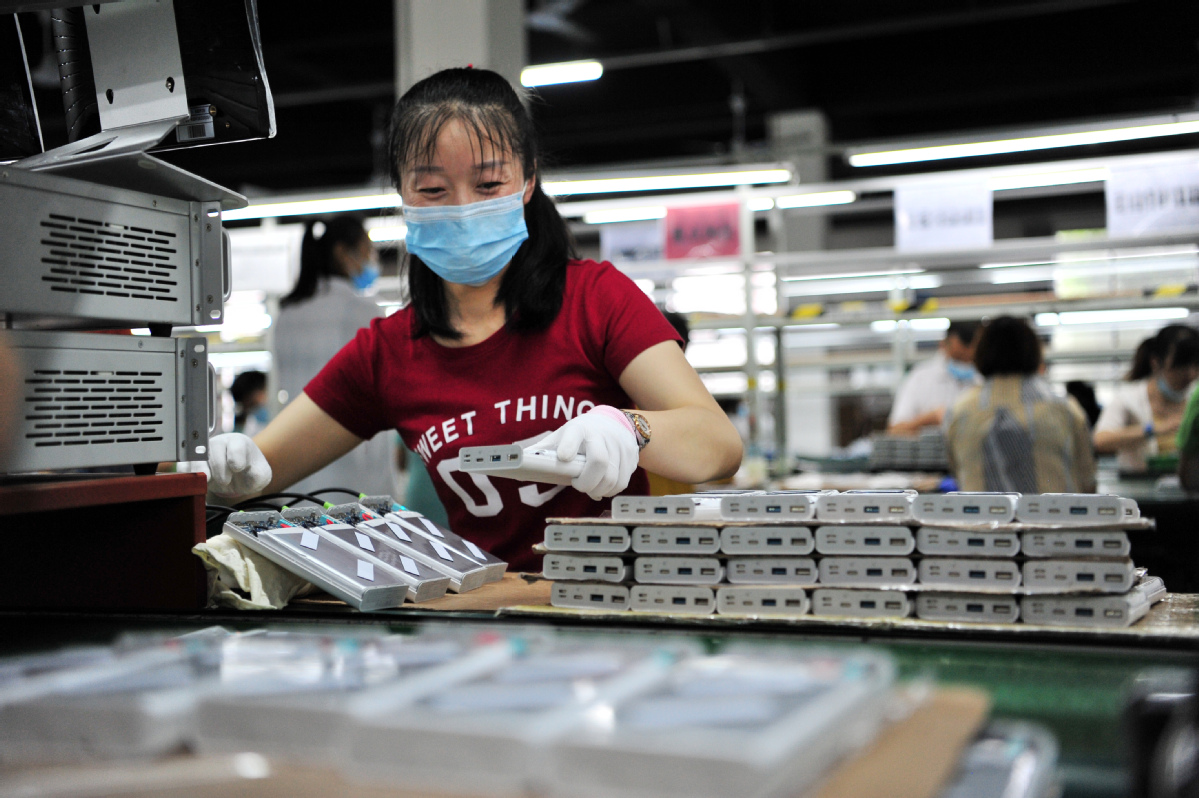
A technician works on the lithium battery production line of a new energy company in Yichang, Hubei province. [Photo by Zhang Guorong/For China Daily]
Policies, work resumption to sustain rebound in second half of year, says study
China's small and medium-sized enterprises notched up an impressive performance during the second quarter of this year on the back of favorable government policies, self-preservation measures and steady work resumptions and the same is expected to continue in the second half of the year, an industry report said.
The China Association of Small and Medium Enterprises said that the small and medium-sized enterprise development index, an index that tracks the growth and performance of SMEs in China, rebounded by 3.5 points on a quarterly basis to 85.5 in the second quarter of the year.
Coupled with the rebound has been the strong show by the development indexes for the eight sub-industries. The development indexes for industry, construction, real estate and wholesale and retail rose by 3.9 points, 4.1 points, 3.8 points and 3.5 points on a quarterly basis, according to the association.
"The recovery in the second quarter is largely due to the supportive government policies, including tax and fee reductions, employment stabilization, and inclusive finance. The nation's goal of stabilizing employment, finance, foreign trade, foreign investment, domestic investment and market expectations has been initially achieved to a large extent," said a statement from the association.
Wu Gangliang, a researcher at the China Enterprise Reform and Development Society, said: "With the epidemic effectively controlled in many regions, enterprises have started resuming work in an orderly manner. Favorable policies from the government are continuing to support the growth of SMEs."
He said that in recent years, the government has launched several tax and fee reduction packages, aimed at reducing corporate value-added tax, corporate income tax, personal income tax, as well as reducing social security expenses and other administrative charges.
"The policies have reduced operating costs and improved working conditions. Many SMEs, especially those in the labor-intensive industries, have benefited from the policies," he said.
He said that the employment stabilization measures, including unemployment insurance return and one-time employment subsidies, have offered precise support to SMEs facing difficulties during the special period and prevented large-scale closures and layoffs.
Shukun Technology, a Beijing-based artificial intelligence-enabled medical company, said it has received timely support from the government in the form of inclusive finance, social insurance payment reductions and subsidies for stabilizing employment during the work resumption period.
Apart from receiving help from the government, many SMEs undertook self-preservation measures during the difficult times. Zhang Yan, general manager of a Shenzhen, Guangdong-based clothing manufacturing enterprise, said that the company undertook several such steps to increase orders and for work resumption. To increase orders, it took advantage of online measures, such as livestreaming promotions, and also took efforts to retain key customers. To motivate the employees during the inactive period, the company offered training and programs to upgrade skills of the employees, before full production resumed in April.
Data from the association showed that industrial enterprises had the best recovery rate from the epidemic, with a work-resumption rate of 93.17 percent. Construction enterprises had the lowest work resumption rate of 84.44 percent.
A closer analysis of the SME development subindexes indicates that enterprises are now more confident than ever about recovery, market expectations, cutting operating costs, boosting labor demand and supply and investment, said the association.
In addition, as production and operations have returned to normalcy, there has been a significant improvement in the overall performance of enterprises, an indication of good times ahead for the entire industry, it said.
Though the association expressed confidence about the strong showing by the SMEs continuing into the second half of the year also, experts like Wu are of the view that it would still depend on factors like the prevalent domestic epidemic situation, overseas situation and the international trade environment.
Source: China Daily

